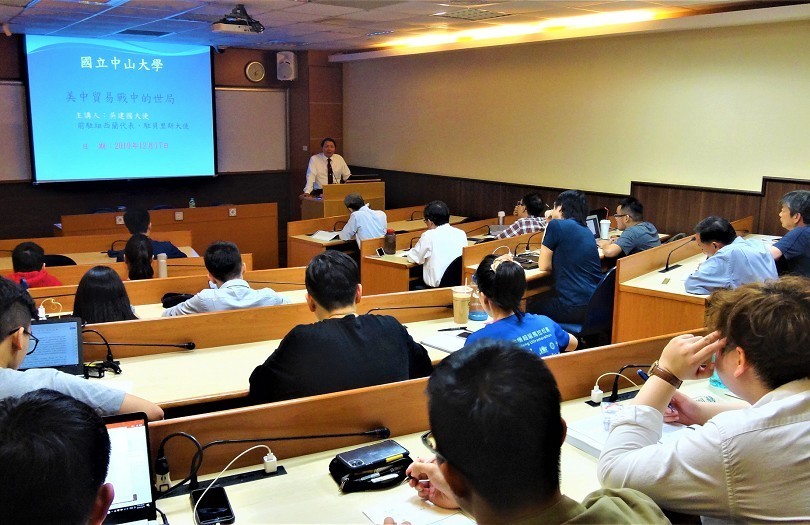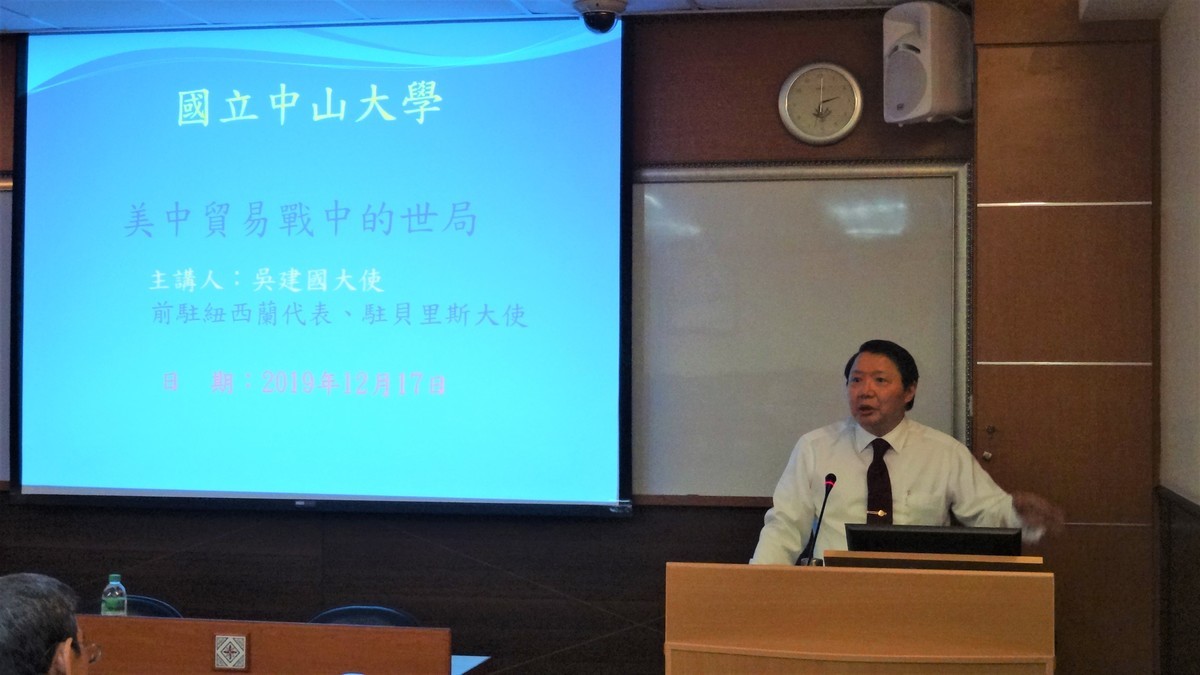A war with no firearms: China–United States trade war affects salaries and job market in Taiwan


(Report by student journalist Tsan-Yu Li)
Trade war between China and USA started in March 2019, prolongs until now and doesn’t leave Taiwan unaffected. The war will have a direct impact on future salaries and job prospects, especially for new graduates. NSYSU Institute of China and Asia-Pacific Studies organized a lecture on the geopolitical background of China–United States trade war and invited Chien-Kuo Wu, Taiwan’s diplomat working for the Taipei Economic and Cultural Office in New Zealand. As an experienced diplomat, he discloses the causes and effects of the “war with no firearms”.
Wu mentioned, that the emerging markets naturally pose a threat to the position of big powerful countries; thus, trade war between China and USA could not be avoided. If Taiwan has to survive in the midst of the conflict between these two powerful countries, it must bring into play its own strengths. Having spent 40 years in the diplomacy frontline, Chien-Kuo Wu said, that “in international relations, there are no eternal friends nor foes, as own best interests have always been the priority of any country”. Thus, he said that the presidential candidate should have the ability to attract allies and provide assistance in pragmatic affairs to protect the political and economic interests of the Republic of China.
Whether you are the president or a university student, you have to follow the trade war. In an interview, assistant professor at the Department of Political Economy Rou-Lan Chen said that the trade war will affect salary levels and job prospects of young students, no matter if they study business or science/engineering. There has been some GDP growth in Taiwan in recent years, however, it was not necessarily perceptible to average people. To a certain extent, it is due to the reliance on the triangular trade mode: consumers order products in Taiwan, which are later shipped from China. Thus, the government should design a policy for the trade war period to attract the investments of Taiwanese businesspeople abroad, promote the development of the local industry, and prevent businesses relocating abroad.
“The sector we should focus on is high tech!”. Professor Chen states that now the USA is attacking the technology industry in China, which might be an incentive to move back to Taiwan for Taiwanese businesspeople working in China in this sector. We would suggest the students who are the target employees of the related companies to follow the news on the trade war and plan their careers well. Although increased customs duties imposed by the USA are not favorable to Taiwan, the rise of the tech sector will definitely be beneficial to the growth of the Taiwanese economy, thus, “the trade war is a crisis but also an opportunity”.
About the future development of the China–United States trade war, Wu guesses, that the current deadlock between the two countries will evolve into a long-time war. Although President Trump is now facing the impeachment of the US Congress, it seems that the unyielding approach of the USA towards China is unlikely to change because its domestic capital has been flowing to China for a long time, and, on top of that, China is now pursuing such technologies as 5G (5th generation mobile networks). On the other hand, although China has suffered heavy losses in the trade war, it has greatly expanded its power and attracted allies in East Asia and Southern Europe. Although there are no firearms in this war, it is a treacherous situation. Wu suggests the students follow the news on the political and economic relations between China and the United States whenever they have time and assess its impact on Taiwan. The trade war is not only a short-term political trial of strength but also an event that will affect the future of Taiwan in the long term.
(Edited by Public Affairs Division)
Trade war between China and USA started in March 2019, prolongs until now and doesn’t leave Taiwan unaffected. The war will have a direct impact on future salaries and job prospects, especially for new graduates. NSYSU Institute of China and Asia-Pacific Studies organized a lecture on the geopolitical background of China–United States trade war and invited Chien-Kuo Wu, Taiwan’s diplomat working for the Taipei Economic and Cultural Office in New Zealand. As an experienced diplomat, he discloses the causes and effects of the “war with no firearms”.
Wu mentioned, that the emerging markets naturally pose a threat to the position of big powerful countries; thus, trade war between China and USA could not be avoided. If Taiwan has to survive in the midst of the conflict between these two powerful countries, it must bring into play its own strengths. Having spent 40 years in the diplomacy frontline, Chien-Kuo Wu said, that “in international relations, there are no eternal friends nor foes, as own best interests have always been the priority of any country”. Thus, he said that the presidential candidate should have the ability to attract allies and provide assistance in pragmatic affairs to protect the political and economic interests of the Republic of China.
Whether you are the president or a university student, you have to follow the trade war. In an interview, assistant professor at the Department of Political Economy Rou-Lan Chen said that the trade war will affect salary levels and job prospects of young students, no matter if they study business or science/engineering. There has been some GDP growth in Taiwan in recent years, however, it was not necessarily perceptible to average people. To a certain extent, it is due to the reliance on the triangular trade mode: consumers order products in Taiwan, which are later shipped from China. Thus, the government should design a policy for the trade war period to attract the investments of Taiwanese businesspeople abroad, promote the development of the local industry, and prevent businesses relocating abroad.
“The sector we should focus on is high tech!”. Professor Chen states that now the USA is attacking the technology industry in China, which might be an incentive to move back to Taiwan for Taiwanese businesspeople working in China in this sector. We would suggest the students who are the target employees of the related companies to follow the news on the trade war and plan their careers well. Although increased customs duties imposed by the USA are not favorable to Taiwan, the rise of the tech sector will definitely be beneficial to the growth of the Taiwanese economy, thus, “the trade war is a crisis but also an opportunity”.
About the future development of the China–United States trade war, Wu guesses, that the current deadlock between the two countries will evolve into a long-time war. Although President Trump is now facing the impeachment of the US Congress, it seems that the unyielding approach of the USA towards China is unlikely to change because its domestic capital has been flowing to China for a long time, and, on top of that, China is now pursuing such technologies as 5G (5th generation mobile networks). On the other hand, although China has suffered heavy losses in the trade war, it has greatly expanded its power and attracted allies in East Asia and Southern Europe. Although there are no firearms in this war, it is a treacherous situation. Wu suggests the students follow the news on the political and economic relations between China and the United States whenever they have time and assess its impact on Taiwan. The trade war is not only a short-term political trial of strength but also an event that will affect the future of Taiwan in the long term.
(Edited by Public Affairs Division)
Click Num:
Share
